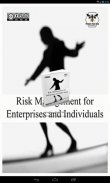




Risk Management

Description of Risk Management
This textbook is designed to reflect the dynamic nature of the field of risk management as an introduction to intermediate-level students. The catastrophes of the first decade of the new millennium, including the credit crisis of 2008–2009, are well depicted and used to illustrate the myriad of old and new risks of our times. With such major man-made and natural catastrophes, this field is of utmost importance for sustainability. The need to educate students to consider risks at every phase in a business undertaking is central, and this textbook provides such educational foundation.
This field requires timeliness as new risk management techniques and products are being developed in response to risks derived from innovations and sophistication. As such, this book allows the reader to be on the forefront of knowledge in the arena of risk management. Tomorrow’s leaders in business and politics and tomorrow’s citizens, consumers, and voters need to understand risks to make successful decisions. This book provides you with the background for doing so.
With the pedagogical enhancements and the ability to make changes dynamically, this textbook brings the best to educators. An important advantage of this book’s publication format is that it can be updated in real time online as new risks appear (e.g., pandemic risk, financial crisis, terrorist attacks). Risk management consequences can be discussed immediately.
The management of risk is, essentially, the strategy for surviving and thriving in a volatile, uncertain, complex, and ambiguous world. Prior to the industrial revolution and the advanced communication age, decisions could be made easily using heuristics or “gut level feel” based on past experience.
As long as the world faced by the decision maker was more or less the same as that faced yesterday, gut level decision making worked fairly well. The consequences of failure were concentrated in small locations. Entire villages were extinguished due to lack of crop risk planning or diseases. There were no systemic contagious interlocking risks, such as those that brought the financial markets to their knees worldwide in 2008–2009.
Saylor URL: http://www.saylor.org/books
Creative Commons Attribution-NonCommercial-ShareAlike 3.0 License
Project Fast Hub, http://www.projectfasthub.com
EPUB3Reader, V. Giacometti, M. Giuriato, B. Petrantuono





















